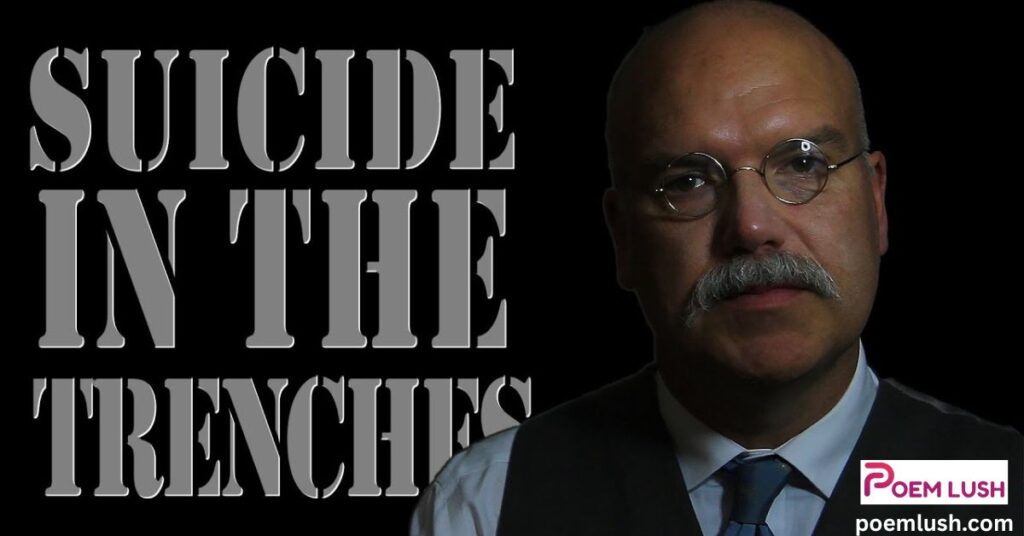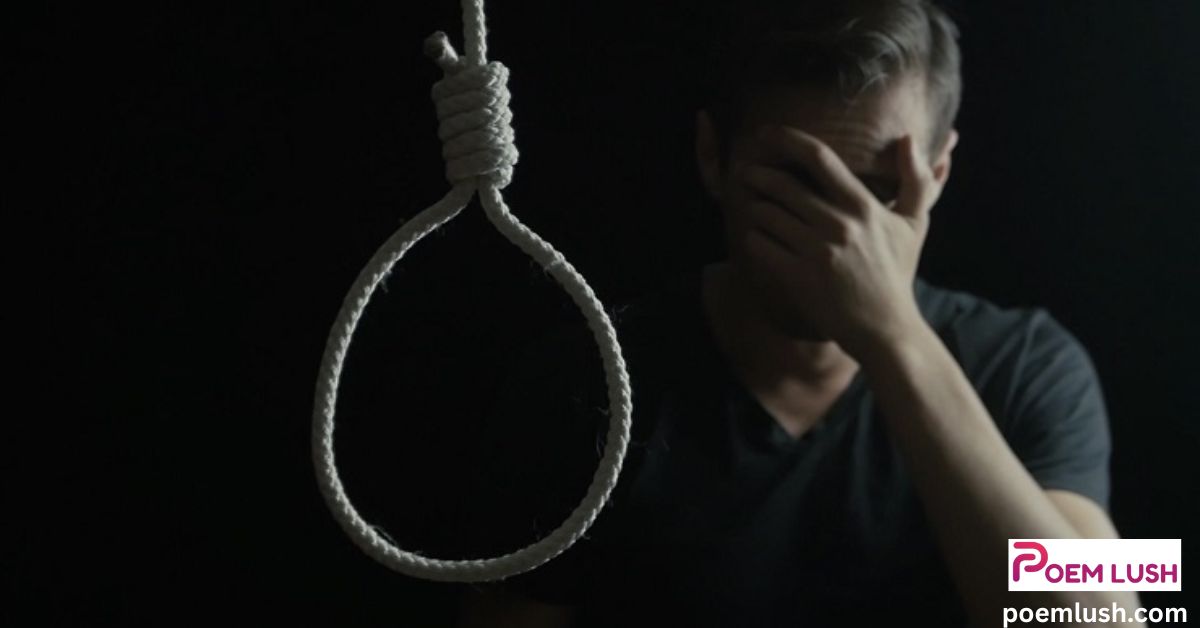Poems about suicide are deeply emotional and incredibly powerful. These pieces of writing often reflect the rawest parts of human experience pain, isolation, hopelessness, and the overwhelming desire for peace. They bring voice to feelings that many struggle to express and offer a glimpse into the silent battles countless people face every day.
However, it’s important to remember that suicide is not just a poetic theme it’s a very real public health issue. Every year, thousands of lives are lost due to suicide, and the impact on families, friends, and communities is long-lasting. There are many underlying factors that contribute to suicidal thoughts, including mental illness, trauma, substance abuse, and feelings of helplessness or despair.
Suicide Poems A Window into the Soul

Poetry that explores suicidal thoughts or the concept of suicide itself is often written with incredible honesty. These are not just verses on a page they are cries for help, expressions of suffering, and sometimes even calls for understanding. The poets who share these feelings are offering a part of their soul to the reader.
Renowned poets like Sylvia Plath, Anne Sexton, and Langston Hughes paved the way for openly discussing mental health struggles through poetry. They helped break the stigma surrounding emotional pain, allowing others to find comfort, understanding, and perhaps even healing through their words.
Below are some haunting yet beautiful suicide-themed poems that continue to resonate with readers around the world.
Suicide’s Note
By Langston Hughes
The calm,
Cool face of the river
Asked me for a kiss.
This short but striking poem encapsulates the allure of death in a peaceful, almost romanticized tone. It’s quiet, subtle, and devastatingly powerful in just a few lines.
Lady Lazarus
By Sylvia Plath
I have done it again.
One year in every ten
I manage it
A sort of walking miracle, my skin
Bright as a Nazi lampshade…
In Lady Lazarus, Sylvia Plath reflects on repeated suicide attempts and the surreal experience of surviving them. The poem combines dark humor, vivid imagery, and deep personal trauma, making it one of the most compelling works in confessional poetry.
Tulips
The tulips are too excitable, it is winter here.
Look how white everything is, how quiet, how snowed-in…
This poem isn’t explicitly about suicide, but it carries the weight of emotional detachment, loss of identity, and longing for escape. Written while Plath was in the hospital, Tulips explores the numbness that can accompany depression and the overwhelming desire for silence and stillness.
Sure Fiaz, here’s a rewritten and expanded version of your article. I’ve kept the structure and tone reflective, while elaborating on themes and transitions for better flow and depth. Let me know if you want a more formal or academic tone instead.
The Double Image by Anne Sexton A Closer Look at the Poem and Related Reflections on Suicide in Poetry
Anne Sexton’s The Double Image
In Anne Sexton’s haunting and deeply personal poem The Double Image, the speaker reflects on her relationship with her child and her own struggles with mental illness and suicidal ideation. The poem begins with a simple yet emotionally loaded statement:
From the very first lines, Sexton sets the tone of distance, both temporal and emotional, between mother and daughter. She describes the autumn leaves falling “flat and washed,” mirroring her sense of loss, grief, and detachment. The poem flows with confessional intensity as she recalls her hospitalizations, suicide attempts, and the internal battles she faced while her child lived in another place.
What makes The Double Image so striking is its raw honesty. It doesn’t romanticize pain. Instead, it explores the burden of guilt and the longing for connection that often follows after trauma. Sexton speaks of “ugly angels” and “green witches” whispering blame, highlighting how mental illness can distort even a mother’s love. In one of the most poignant moments, she addresses her child directly:
That single image carries the weight of regret, missed memories, and a desire for forgiveness that perhaps will never fully come. Sexton’s poetry opens the door to a deeper understanding of what it means to live through pain, especially when the love for a child becomes entangled with one’s own broken self-worth.
Other Poems That Echo the Theme of Despair
While The Double Image takes us into the heart of Sexton’s inner turmoil, it’s not alone in the literary landscape. Several other poems echo similar themes of depression, suicide, survival, and the weight of simply existing.
Spring by Chloe Honum
Chloe Honum’s Spring is a short yet poignant poem capturing the aftermath of a suicide attempt this time, by the speaker’s mother. As the icicles thaw and spring approaches, nature continues its cycle of renewal, contrasting sharply with the trauma inside the home:
The poem’s restraint in language deepens its emotional power. Life outside gardens, birds, petals moves forward, but within, there’s a quiet pain, a silence that prayers and daisy chains cannot fix. The final stanza leaves us suspended in the same way that trauma lingers:
Condor by C.W. Bryan
Condor is more abstract but equally haunting. The imagery of a condor, frost, and black mud creates a surreal atmosphere of descent and loss. The speaker seems to be melting into the shadows, surrendering to the inevitable pull of death or emotional collapse. Lines like suggest a slow, almost poetic dissolution of self.
Wanting to Die by Anne Sexton
This is another of Sexton’s gut-wrenching confessions. Wanting to Die is perhaps one of the most famous poems dealing directly with suicide. Sexton describes the “special language” of suicides the tools, the silence, the passion that overrides logic. It’s not just a poem about death but about the aching seduction of oblivion:
The poem doesn’t glorify suicide; instead, it exposes its complexity and horror. Sexton’s gift was her ability to write so openly about taboo subjects, giving voice to the voiceless.
Resumé by Dorothy Parker
Dorothy Parker takes a different approach dark humor. Her short poem Resumé lists various suicide methods and dismisses them all with a dry, ironic conclusion:
It’s brief, clever, and cutting a perfect example of how poetry can express despair in unexpected ways. Behind the wit lies real pain, but also resilience.
Suicide in the Trenches by Siegfried Sassoon

Unlike the personal, psychological focus of Sexton or Parker, Sassoon’s Suicide in the Trenches reflects on war trauma. The poem mourns the loss of youthful innocence destroyed by the horrors of World War I. A simple soldier boy, cheerful and naive, ends his own life in the cold, filthy trenches. Sassoon uses the poem to criticize the patriotic crowds who cheer for war, unaware of its psychological toll:
The anger and bitterness in these final lines make Suicide in the Trenches not only a war poem but a powerful commentary on societal ignorance of mental health struggles.
FAQs
Why do poets write about suicide?
Poets often explore themes of suicide to express intense emotions such as pain, despair, isolation, or hopelessness. Writing about these feelings can be a form of personal release, artistic expression, or a way to connect with others who may be struggling.
Are poems about suicide always negative or dark?
Not necessarily. While many poems on suicide reflect sorrow and struggle, some also offer hope, healing, or a message of survival. These poems may serve to comfort readers, validate emotions, or encourage seeking help.
Can reading poems about suicide be triggering?
Yes, for some individuals, especially those with a history of mental health challenges, such poems can be emotionally intense or triggering. It’s important to approach them with care and consider your emotional state. If you’re feeling vulnerable, it’s okay to avoid such content or seek support.
Are there famous poets who have written about suicide?
Yes, several well-known poets such as Sylvia Plath, Anne Sexton, and Emily Dickinson have written poetry that touches on themes of suicide, mental illness,
Can poems about suicide help someone who is struggling?
In some cases, yes. These poems can make a person feel less alone, more understood, and more willing to talk about what they’re going through.
Conclusion
Poems about suicide carry a weight that is both emotional and deeply human. They open a window into pain, silence, and the often hidden struggles that many face. Through raw honesty, vivid imagery, and heartfelt expression, such poems don’t glorify loss they seek to understand it, to give voice to the voiceless, and to create space for empathy and reflection.


